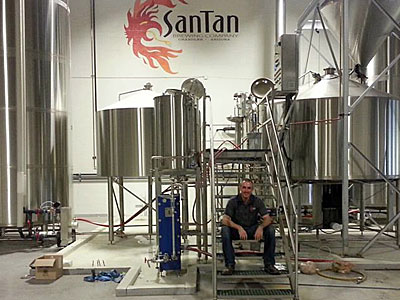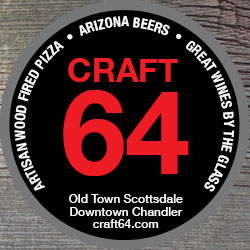SB 1030, the so-called Arizona Beer Bill, sailed through the Arizona House of Representatives on Wednesday, its final passage by a unanimous 59-0 vote.
It’s now being transmitted back to the Arizona Senate, where it was approved last week, to be sent to the governor for his signature.
Once signed, it’ll become law in 90 days (so probably around the end of June).
So, what will change for Arizona breweries?
The biggest change will be in the amount of beer they’re allowed to produce while retaining special exemptions from the three-tier system.
Under current law, an Arizona microbrewery license (also known as a Series 3) caps production at 40,000 barrels per year.
When they reach that limit, breweries must switch to an in-state producer license (Series 1), which has no cap but also no exceptions, such as the right to operate an off-site pub.
The current law was hindering the growth of the state’s two largest breweries, but for different reasons.
Four Peaks at the limit
Four Peaks Brewing has two microbrewery licenses (one for its Eighth Street brewpub and another for Wilson Street production brewery) so its annual production was capped at a combined 80,000 barrels.
The Tempe brewery’s production likely will approach 70,000 barrels in 2015, putting it just a year or two away from reaching the limit.
If it switched to a current producers license, it could surpass the 80,000 barrels but it would be forced to divest itself of any “retail” locations, a.k.a. its off-site pubs in Scottsdale and at Sky Harbor Airport.
Compounding the problem is equipment and crucial ingredients like hops often are contracted up to a year in advance. So the brewery’s growth virtually was at a standstill.
Under the new law, though, Four Peaks now can switch to a new producer license that covers both its brewhouses with a cumulative cap of 200,000 barrels and allows its to keep its all of its pubs.
SanTan still not certain
SanTan Brewing likely will produce 30,000 barrels between its two breweries in 2015, so capacity isn’t an immediate issue. But license vagueness is.
The Chandler brewery took a different route than Four Peaks, getting a producer license for its production facility that opened in 2014 and keeping the microbrewery license for its downtown brewpub.
The current law doesn’t say a brewery can have a microbrewery license (and its privileges) at one location and a producer license at another. But it doesn’t say it can’t, either.
SB 1030 eliminates that uncertainty – applying for the new producers license requires surrendering a microbrewery license – but there still is an unresolved issue that uniquely affects SanTan.
SanTan has considered opening an off-site pub or two, just like Four Peaks, but understandably has been hesitant to make such investments not knowing whether they would be allowed to keep them.
The new license law now allows breweries to keep up to seven existing retail locations when they switch to a producer license at the 40,000-barrel plateau.
Is SanTan now prohibited from doing so because it has an existing producer license, or is it allowed since it hasn’t yet applied for one of the new producer licenses and hasn’t reached the 40,000-barrel threshold?
What’s ahead?
Other than Four Peaks and SanTan, no other Arizona brewery is expected to produce more than 10,000 barrels in 2015. The new law, though, will help them in the future.
And there are some smaller changes that could help them immediately.
One allows breweries with just a microbrewery license to sell a limited amount (up to 20% of total beer sales) of other microbreweries’ beers without having to get an additional license.
It should be noted the final version of SB 1030 that passed the legislature is not the original version the Arizona Craft Brewers Guild was hoping for.
In a compromise with the spirits industry, the bill was amended to replace an unlimited cap with the 200,000-barrel limit, a plateau already exceeded many times over by breweries in California, Colorado, and other states.
Meaning that, in a few years, the guild likely will have to go back before the legislature to raise the cap again to remain competitive.
📧 Subscribe to the free MXSW Daily Email here for the latest news about food & drink in the Phoenix metro area.





















